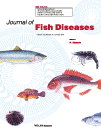Immune responses to prebiotics in farmed salmonid fish: How transcriptomic approaches help interpret responses

Abstract
Within aquaculture, prebiotics are composed of complex carbohydrate molecules that cannot be digested by the fish directly but are metabolised by the microbial communities within the host gut, with the desire that “healthy” bacterial species are promoted with subsequently improved performance of the fish, there are likely some direct responses of intestinal cells to these dietary components. The sources and processing of prebiotics, which fall under the overarching theme of “functional feeds” are highly varied between species and types of prebiotics administered. How these feeds exert their effect, and the host responses are hard to determine, but new technologies and the development of high-throughput technologies (omics) are enabling the mechanisms and methods of action to be further understood. The recent advances in the availability of ‘omics’ technologies with the transition from single gene assays to microarray and RNA-seq in fish health have enabled novel functional ingredients to be analysed. This review will focus on recent studies on targeted gene expression and ‘omics’ technologies to characterize immune responses. Comparisons between the immunomodulatory effect of different prebiotics have been made and specific examples of how transcriptomics techniques have been used to identify immune responses to prebiotics are given.
